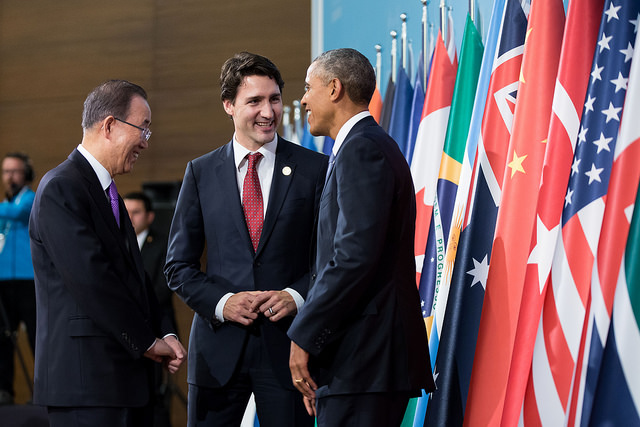rabble is expanding our Parliamentary Bureau and we need your help! Support us on Patreon today!
It isn’t an exaggeration to say that the Trans-Pacific Partnership will fundamentally change global trade and work. Considering the implications of the deal, the Canadian labour movement must figure out how exactly it plans to fight for workers under the new regime.
Of course, the TPP hasn’t actually been signed. Justin Trudeau has promised very minimal debate, which is unlikely to change the agreement. It was mostly finished by the time he was elected.
Trudeau’s government won on the promise of “real change” and nowhere else is “real change” as much like “real status quo” than on the trade file.
This presents an enormous opportunity for labour activists: either seize the optimism that brought the Liberals into power to expose the worst elements of the TPP, or do nothing and lose the small opening that currently exists. Objectively, there’s no question about which route to take. But sometimes, the decision-making process isn’t this simple.
Private-sector unions have mostly focused on the impact that the TPP will have on manufacturing. Deepened trade liberalization will continue to move manufacturing to less expensive regions and Canadian jobs will certainly vanish.
Public-sector unions have mostly focused on privatization. Under the TPP, public services may very well be challenged by foreign powers. Together with privatization-friendly politicians, Canada’s health, education and social service sectors could face international pressure to privatize under the guise of trade liberalization.
But what’s been missing from the debate is the role that the TPP will have in further subjugating a global class of poor workers. Under the TPP, wage disparities will increase and the global working class will become even poorer. This will disproportionately impact racialized workers and women.
As manufacturing jobs migrate out of Canada, there is a loss not just of Canadian jobs, but of unionized members doing the work at all. Capital will go to countries where labour is cheap and workers are less organized. Without unions present to help mitigate the effect that unregulated capitalism has on the working class, the TPP will further exacerbate deep social inequalities that exist among the signature countries of the TPP.
The difficulty for labour is that fighting against these provisions in the TPP requires solidarity (and action) to protect workers who are not unionized and, mostly, not Canadian. For a system that is set up to advocate on behalf of a dues-paying membership, this can pose a problem: how much time and money should unions spend to support workers who aren’t members or in Canada?
It’s a structural difficulty, but philosophically easy to answer: Canadian labour should fight to protect these workers because it’s the right thing to do. To defend the working class in the era of globalization means defending the working class globally, especially when it’s our government that’s rushing to create structures that will allow for the wholesale exploitation of these workers.
More importantly, it’s accessible and basic international solidarity work that both touches workers at home and creates an opening to talk about racism and race, conversations that are sorely needed.
rabble is expanding our Parliamentary Bureau and we need your help! Support us on Patreon today!
Image: Flickr/pmwebphotos
An earlier version of this article included a section which incorrectly interpreted investor-state dispute settlements with respect to collective agreements. rabble.ca regrets the error.




